Africa's Vaccine Dependency: 99% Imported, 0.2% Locally Produced
Africa, despite consuming nearly a quarter of the world's vaccines, imports an overwhelming 99% of its vaccines and 90% of its medical supplies. The COVID-19 pandemic highlighted this dependency, with countries hoarding doses and restricting exports. Only 0.2% of Africa's vaccine needs were met through domestic manufacturing in 2022.
Historically, countries like Senegal and South Africa had vaccine production facilities. However, dependency on foreign aid and underinvestment led to a decline in Africa's vaccine production capacity. The Saving Lives and Livelihoods (SLL) initiative aims to vaccinate 70% of Africa's population and stimulate local production.
Currently, only three African countries consistently meet the Abuja Declaration's target of allocating at least 15% of their national budgets to health. Nigeria once had a thriving vaccine production hub, which closed in 1991 and has not resumed since. The African Union has set a goal to produce at least 60% of the continent’s vaccines domestically by 2040.
The high import dependency and low domestic production of vaccines in Africa pose significant challenges. With over 100 major disease outbreaks annually, improving vaccination coverage and strengthening health systems are crucial. The continent's underrepresentation in global clinical trials also highlights the need for more tailored healthcare solutions.







